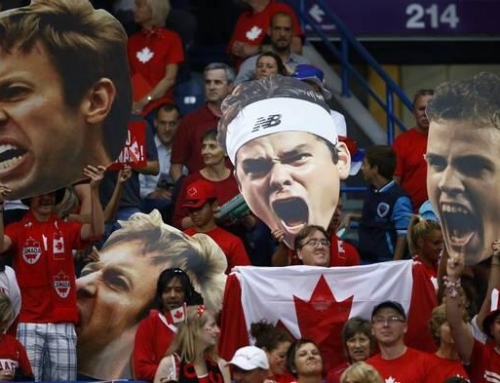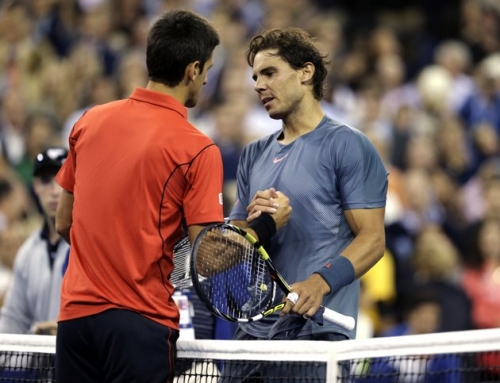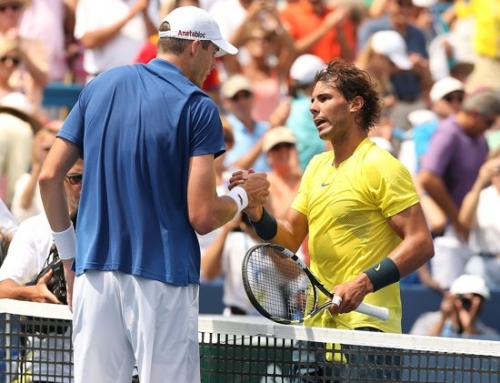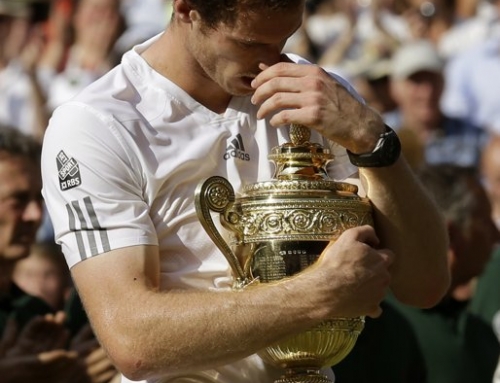 Few teams have the kind of firepower that the Spanish team has. With potential number 1 Rafael Nadal and perennial number 5, David Ferrer, Spain boasts a team that can’t be matched by any other country. Even the great Roger Federer only has Stan Wawrinka. Wawrinka is good, but he can be beaten by any number of players. In any case, with Federer eye-ing Slams, he has often played in relegation matches keeping Switzerland in the World Group, but not playing at other times. It doesn’t hurt that the Davis Cup captain is an unofficial coach, Severin Luthi.
Few teams have the kind of firepower that the Spanish team has. With potential number 1 Rafael Nadal and perennial number 5, David Ferrer, Spain boasts a team that can’t be matched by any other country. Even the great Roger Federer only has Stan Wawrinka. Wawrinka is good, but he can be beaten by any number of players. In any case, with Federer eye-ing Slams, he has often played in relegation matches keeping Switzerland in the World Group, but not playing at other times. It doesn’t hurt that the Davis Cup captain is an unofficial coach, Severin Luthi.
The Serbian team ought to be pretty good, too, since they have number 1 Novak Djokovic and number 9, Janko Tipsarevic, but with Djokovic also eye-ing Slams, he doesn’t always play every tie, and in two rounds this year, Djokovic didn’t play. Argentina has had David Nalbandian for a while, but at the time, there was no worthy backup. Ever since Nalbandian’s rank has slipped and Juan Monaco has gone up, the duo of del Potro and Monaco would produce a similar team to Serbia. Alas, this year, del Potro got hurt in the semis and so Berdych, rather than playing del Potro, played Berlocq instead.
Several teams appear to have the right ingredients for a good run, but Spain is at the top of the heap. The only reason other teams have a chance is because Nadal gets hurt enough that he doesn’t play every tie. This year, Nadal even begged out of Davis Cup so he could focus on the Olympics, which, due to injury, he didn’t even get to play at all. Even so, Spain has Ferrer, and Almagro is just tough enough.
Almagro’s best surface is clay. He’s got a pretty big one-handed backhand, and is up there with number of aces served. With a power game like that, it’s surprising that Almagro struggles on faster surfaces. Part of it is his return game. Good servers seem to get to Almagro on fast surfaces. He’s also not spectacularly quick.
Still, 2012 was a good year on faster surfaces for Almagro. He reached the fourth round of the Australian Open (losing to Berdych in the infamous no handshake match), the quarters of Indian Wells, the fourth round of the US Open (again, losing to Berdych), the semis of Stockholm (losing to, you guessed it, Berdych), the quarters of Valencia (losing to Ferrer). So, overall, decent results.
Stepanek’s results weren’t nearly as good since Stepanek is nowhere near the clay player that Almagro is. He reached the semis of Memphis, but lost early in Indian Wells (to Tsonga) and Miami (to Nadal). He lost to Almagro at the US Open in the first round. He did reach the quarters at Shanghai, one of his better results of the season.
By all accounts, Almagro should have been mildly favored to beat Stepanek given how both have played this year, but there was an unusual decision made by Stepanek that may have contributed to the Czechs doing well this year.
Stepanek, who started his career as a doubles specialist, then played singles for a number of years, decided to play doubles this year, teaming up with Leander Paes. Paes had been in an on-again, mostly off-again relation with Mahesh Bhupathi. For the sake of the Olympics, they tried to bury their differences in 2011, but it didn’t work out, so Paes was looking for a new partner, and found it in Stepanek. The two hit it off right away and won the Australian Open. They even reached the finals of the US Open, though lost to the Bryan brothers.
They were so good that they ended the year 4th in the points race. Stepanek had to decide whether he wanted to prepare in the Czech Republic and skip London or play in London. He said his knee had been bothering him. However, he decided to give it a go. The duo swept their group in wins and made it to the semis. In doing so, they also met Granollers-Lopez who they beat, and who Stepanek knew they would face in the Davis Cup finals.
Stepanek is one of those rare players that likes to come to net. He and Michael Llodra are players born in the wrong generation. Thus their odd style of serve and volley, once so prevalent in the game, are now oddities. By playing doubles more, Stepanek could work more on his volley and his net instincts, and by pairing with Paes, he could learn from one of the best in the game.
Stepanek had insisted that when they practiced, they needed to devote an hour to singles play so he could prep himself for the finals. Although Stepanek, being the number 2 man, had struggled to win matches in Davis Cup (he has about a .500 winning record), he knew that it may come down to him to win the Davis Cup, given how tough it is to beat Ferrer.
For the Czechs to win, Berdych had to win in singles, and the duo had to win in doubles. It was too much to ask Stepanek to upset David Ferrer who had been on a roll ever since winning Valencia and Paris back to back.
The hope was that Berdych could win over Almagro and Ferrer. Berdych had beaten Almagro four times in 2012, so he had a history of victories. However, Almagro was able to push Berdych to 5 sets, and with Berdych also playing doubles, there was concern whether Berdych could keep up with Ferrer who would force Berdych to run a lot and expend energy. A doubles victory would mean Stepanek could still be a hero.
When the Czechs won the doubles, Stepanek made a prophetic statement. He said one reason Almagro had done so well against Berdych was that he could play relaxed. Ferrer had taken the opening match with a 1-0 lead. Almagro wasn’t expected to beat Berdych given their head-to-head, but had the kind of game that could bother him. He could play free and easy while Berdych knew he had to win for the Czechs to have any sort of chance. Stepanek said that Almagro would be under tremendous pressure if it was left to him to win it all, and that playing in front of a noisy, partisan crowd would be much tougher.
Stepanek also realized that, as one of the few serve-and-volleyers, he had the kind of game that is unusual. If Almagro had to play, oh, say Granollers or Monaco, a guy who plays a similar style to himself, then Almagro’s chances would be better. But Stepanek likes to play at the net. He has a solid serve that he can rely on, and he hits flat, penetrating groundstrokes, but can also mix in slices and off-pace shots.
Almagro isn’t the kind of passer that Ferrer or Murray or Nadal is, so constantly pressuring him is a good tactic. Stepanek played quite a few shots up the middle to take away the angle from Almagro. When given the opportunity, Stepanek can change the direction of the ball, hitting inside out forehands, or even a sharp angled backhand. That level of pace caught Almagro by surprise.
Sometimes Stepanek would just slice short balls, goading Almagro to come to net, where Almagro struggled. Almagro was so concerned about having to come to net, that he started going for bigger approaches, often missing in the process.
Stepanek gave himself a ton of break chances too, and it was credit to Almagro that he fought so many off. Almagro did get a break up in the second set, but with Stepanek pressuring, he got the break back by passing Almagro. Then, Stepanek went on a tear in the tiebreak. In the end, Stepanek played the big points better. He was almost broken again in the second set, but came back to win the game.
Luck was even in Stepanek’s favor. In one game, net cords caused balls that Almagro hit to fly out. He even complained to Alex Corretja, the Spanish captain, who shrugged as if to say “What can you do?”.
In the end, it was a combination of self-belief, good execution, and nerves by Almagro who flailed some that lead Stepanek to engineer the upset. Stepanek did all the right things, including keeping points extended by getting to shot after shot, waiting for the Almagro error. Almagro must have known that he’d have to break, take a tiebreak, and push the match into a fifth set, but despite making some moves on Stepanek’s serve, his resolve held firm.
And, honestly, for the fans, it was great. It’s so rare to see a net player play well. With Stepanek a few weeks short of 34, this victory had to come now. While there may be a window of a year or two, other teams are still very strong. The Czechs will be in the mix, but the French, the Serbs, the Argentines all have solid teams, in addition to Spain, of course. It’s tough for the Czechs because they have a two-man team with no good backups.
And of course, it was Stepanek’s energy and doubles expertise that helped them take the all-important second point.
It’s so rare for a team that needs stars to align to win that victories like this are cherished. Djokovic said the same about when Serbia won its first Davis Cup. The Czechs had only ever won this once, back when the current players weren’t even born (or in Stepanek’s case, when he was very young).
You know, of current countries, Argentina is the one that is probably most capable of clinching the Cup but has not done so, losing in 4 finals, three of them since 2006, and twice to Spain.
Now, Stepanek and Berdych and the rest of the team (including Lukas Rosol, who upset Nadal at Wimbledon) can celebrate something that had fervently hoped for with the rest of their nation, and both can take credit for making it all possible.





![[US Open Men’s Final] Can Djokovic beat Nadal in the finals?](https://www.essentialtennis.com/wp-content/uploads/2013/09/20130909djokovic-500x383.jpg)

